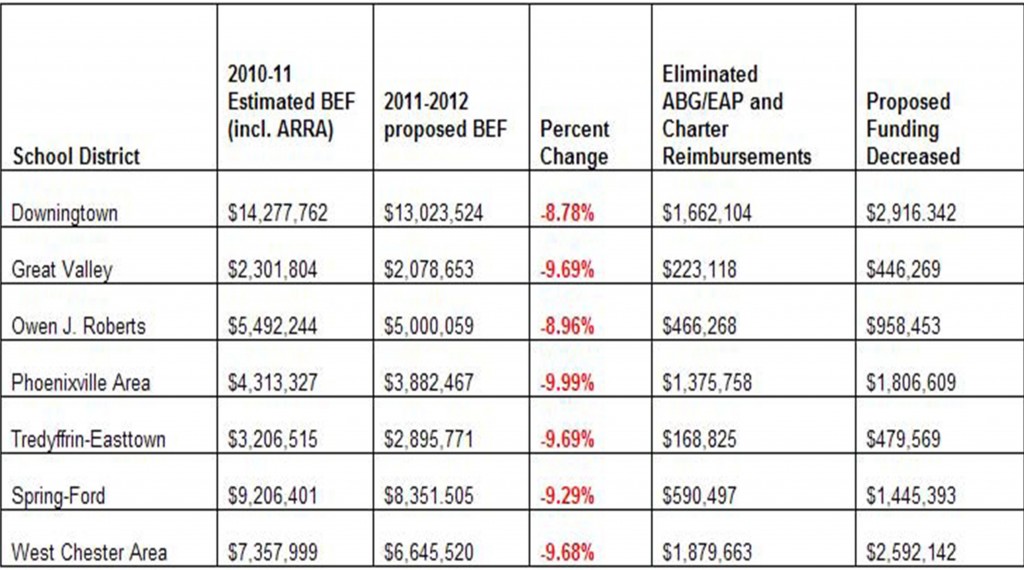Following-up on my post from yesterday concerning T/E School District’s financial outlook and the ongoing debate on how to close the $3.5 million+ budget gap, I don’t know how much help we can expect from Harrisburg.
Yesterday, at a Senate Appropriations Committee meeting, the Acting Education Secretary, Ronald Tomalis took a hard-line when it came to school district budgets, suggesting among other things, that they should have planned better with the federal stimulus money. He stood firm in his defense of Corbett’s proposed $1.2 billion buts to public and higher education.
Tomalis attitude towards successful public school education mirrored some of those that have commented on Community Matters. He suggests that success is not measured by how much school districts spend but rather there are other significant factors . . . quality of teachers, class size, etc. that make a difference. More money spent does not necessarily correlate to better education.
In reviewing the state’s public education funding in prior years, Tomalis noted that the budget has more than doubled over the last 10 years but that enrollment has dropped by 50,000 students, which translates to a higher per student cost. Interestingly, he suggests that the improvement in academic achievement has not increased as more money has been spent. Rather than looking at the money spent per child to educate as a tool to measure success, Tomalis’ theory is that graduation rates and test scores present a more accurate picture of individual school district success.
In looking at what has driven the upward spiral of spending in public education, Tomalis directed criticism at school district spending habits in recent years. He noted that $1.1 billion has gone toward teacher and administration raises rather than educational programming since the recession began in 2008, citing labor costs are determined at the local level. According to Tomalis, Corbett’s suggestion of a one-year salary freeze for public education employees was an attempt to help the school districts with their budget problems. In addition to saving school districts an estimated $400 million with this one-year freeze, Tomalis believes that as many as 4,000 public school jobs could be saved as a result of the salary freeze.
Many have commented on Community Matters that the fate of our local school district budget deficit needs to be addressed in Harrisburg but there seems an attitude from Tomalis that the problem rests squarely on the shoulders of local elected school board members. “We hire these leaders at the local levels to make the tough decisions,” Tomalis said. “And we don’t just hire them to lead in good budget times, but we hire them to lead in tough times, too”. Strong words from Harrisburg that sound a bit like a ‘you deal with it’ attitude towards the school boards. Interesting. I am hopeful that Tomalis’ remarks also include an expectation that local state representatives are to help their respective school districts manage their budget problems.
In discussing how school districts could find savings, Tomalis suggested that districts could share superintendents or share contracts for business operations. Another cost-saving suggestion was merging of school districts. There are currently 500 school districts in the state, and it is believed that state funding could be improved with fewer districts.
Much of the discussion at the committee meeting centered on what the state budget cuts will mean to the local school districts. How are the districts going to meet the demands of their budget? For many districts, the state funding cuts are going to force local property taxes to skyrocket. When questioned about the dramatic property tax increases for some residents violates Corbett’s pledge ‘not’ to raise taxes, Tomalis vehemently disagreed. I disagree with Tomalis disagreeing . . . if Pennsylvanians end up with a higher property tax bill because of state cuts in public education spending, that is a tax increase. I do not believe by pushing the increase down to the local level, removes the responsibility of the tax increase from our elected officials shoulders in Harrisburg. Is it fair for the governor’s budget to force school districts to raise property taxes?
Sen. Andy Dinniman questioned that some groups are saying there is potential that the budget cuts could destroy public education. Tomalis denied that there would be an impact to the quality of education with the budget cuts; suggesting that the federal stimulus money was the cause for the cuts. The stimulus money was an intended one-time use and now with that money gone, the state is left with a budget hole to fill. Accordingly, Tomalis blamed the school districts for not better planning for the end of stimulus money. “If you were told again and again that this is a funding cliff that is coming in two years, and you were advised not to make an expenditure that is going to lock in for five or 10 years down the road, it does matter,” said Tomalis.
In reading the transcript from the meeting, other education topics were discussed, including voucher program (Tomalis is a supporter), teacher furloughing, charter schools, etc. In addition there was discussion at the Senate Appropriations Committee meeting centered on higher education and the severe funding cuts to state universities and colleges. For the purposes of this post, I decided to focus my comments on the local school district funding issue.
Tomalis takes his education platform to the House Appropriations committee today.
